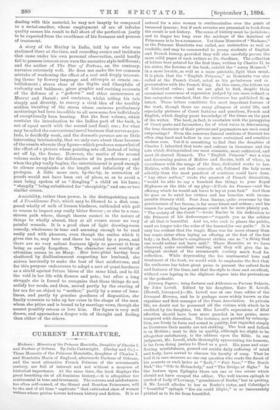CURRENT LITERATURE.
Madame Memoirs of the Princess Henrietta, Daughter of Charles I. and .Duchess of Orleans. By Julia Cartwright. (Seeley and Co.)— These Memoirs of the Princess Henrietta, daughter of Charles I. and Henrietta Maria of England, afterwards Duchess of Orleans, and the most attractive French Princess of the seventeenth century, are full of interest and not without a measure of historical importance. At the same time, the book displays the great besetting sin of all feminine history,—it is altogether too sentimental in tone and treatment. The sorrows and misfortunes, too often self-caused, of the Stuart and Bourbon Princesses, will to the end of all time " captivate " that cultivated class of women writers whose genius hovers between history and fiction. It is so natural for a nice woman to sentimentalise over the griefs of bereaved Queens ; but if such reveries are presented in book-form the result is not history. The muse of history must be judicious ; and to linger too long over the mishaps of the daintiest of Princesses is to be a romancer. Yet these Memoirs of "Madame," as the Princess Henrietta was called, are instructive as well as readable, and may be commended to young students of English and French history, provided they will also carefully peruse the more solid pages of such writers as Dr. Gardiner. The collection of letters here printed for the first time, written by Charles II. to his sister, the heroine of the book, exhibit the " merry Monarch " in a more lovable, as well as a more patriotic, light than usual. It is plain that the " English Princess," as Henrietta was also called at the French Court, acted as his go-between and re presentative with the French King. In this sense, the letters are of historical value; and we are glad to find, despite their occasional coarseness of expression judged by our more refined cr less outspoken standard, that the authoress has published the intact. These letters constitute the most important feature ct the work, though there are many glimpses of social life, and especially pictures of Court fashions and practices, French and English, which display great knowledge of the times on the part of the writer. The book, in fact, is overladen with the panegyrics of Court poets and favourites ; for of what value in determining the true character of their patrons and paymasters are such venal outpourings P Even the sonorous funeral orations of Bossuet too often ring hard and hollow in our more restrained and sensitive modern ears. Yet it is something to find that the daughter of Charles I. inherited that taste and culture in literature and the arts which distinguished our most romantic, most cultivated, and most ill-starred Monarch. The "English Princess" was a wise and discerning patron of Molike and Racine, both of whom, in accordance with the usage of the time, dedicated works to her. Moliere, with the art that conceals art, flattered the lady more, adroitly than the most practical of courtiers could have done. "Any other author," wrote the greatest of French dramatists, " would be able to say a hundred fine things to your Royal Highness on the title of my play—L'Ecde des Femmes—and the offering which he would ask leave to lay at your feet." And then he goes on to extol her virtues and her beauties with incom- parable literary skill. Poor Jean Racine, quite overcome by the graciousness of her favour, is far more blunt and artless ; and his reason for seeking her patronage could not be more plainly put. " The society of the Court "—wrote Racine in his dedication to th'e Princess of his Andromague —" regards you as the arbiter of all that is beautiful. And we, who seek to please the public, need no longer take the rules of the learned for our guide." It is. only too evident that the tragic Mpse was far more clumsy than her comic sister when laying an offering at the feet of the fair lady ; in fact, Racine's compliment strikes one as " a thing that one would rather not have said." These Memoirs, as we have observed, make excellent reading, and they will give the in- telligent student of the seventeenth century much food for reflection. While deprecating the too sentimental tone and treatment of the book, we would wish to emphasise the fact that the authoress has taken great pains to present the salient facts and features of the time, and that the style is clear and excellent, without ever lapsing in the slightest degree into the pretentious or the pedantic.


































 Previous page
Previous page